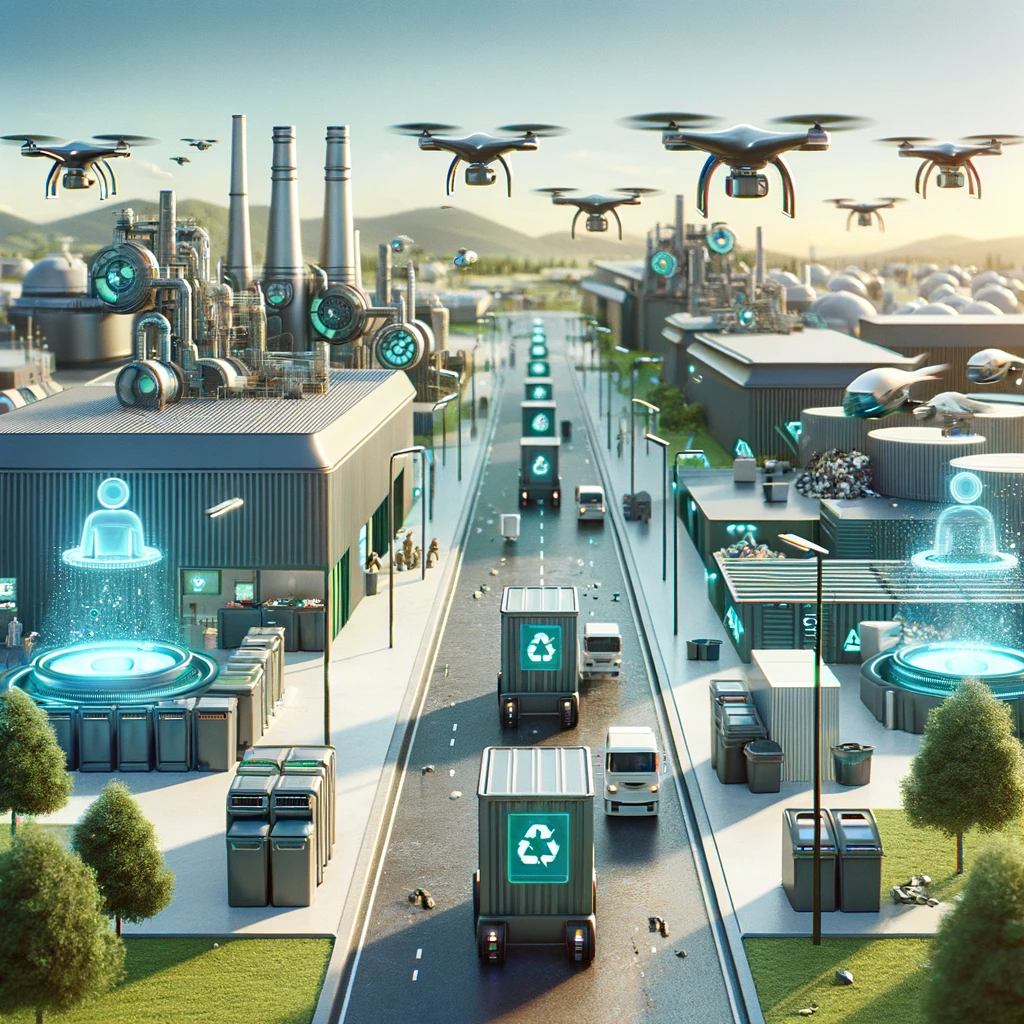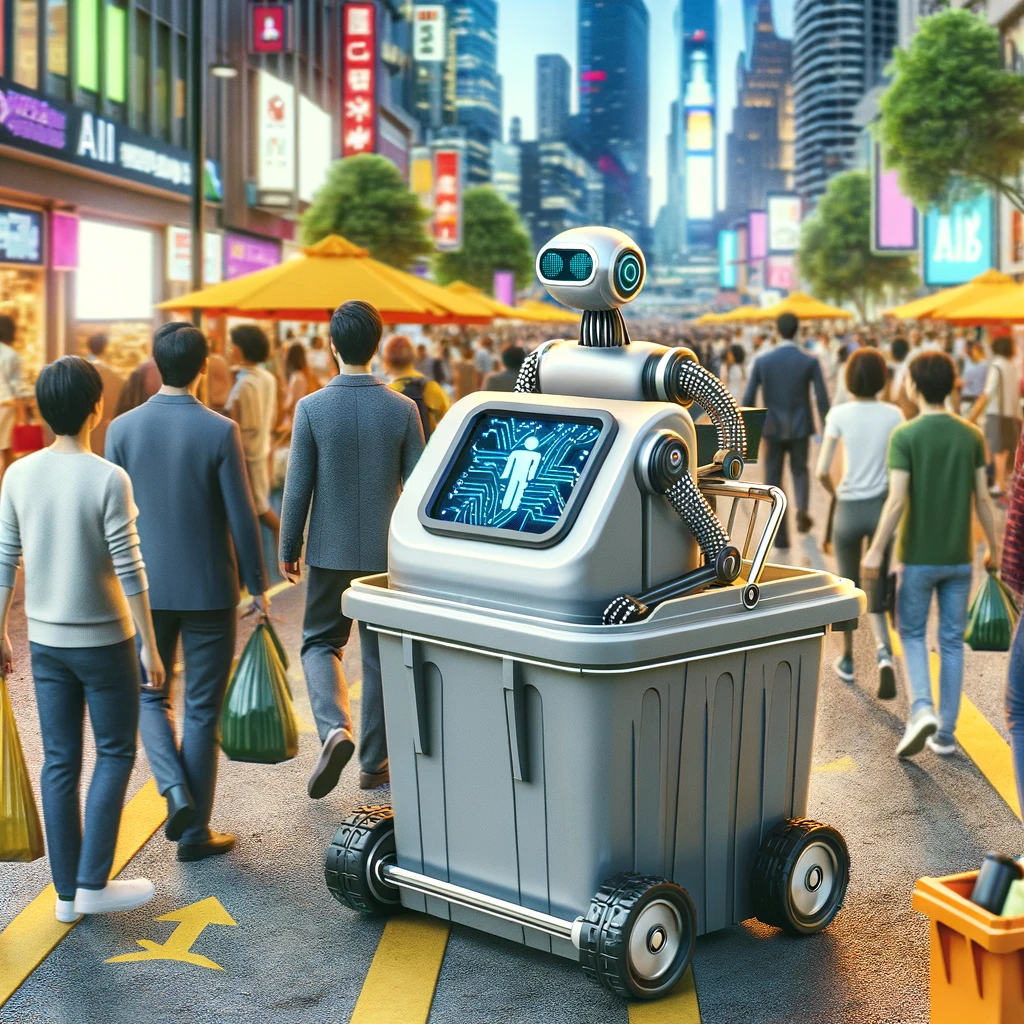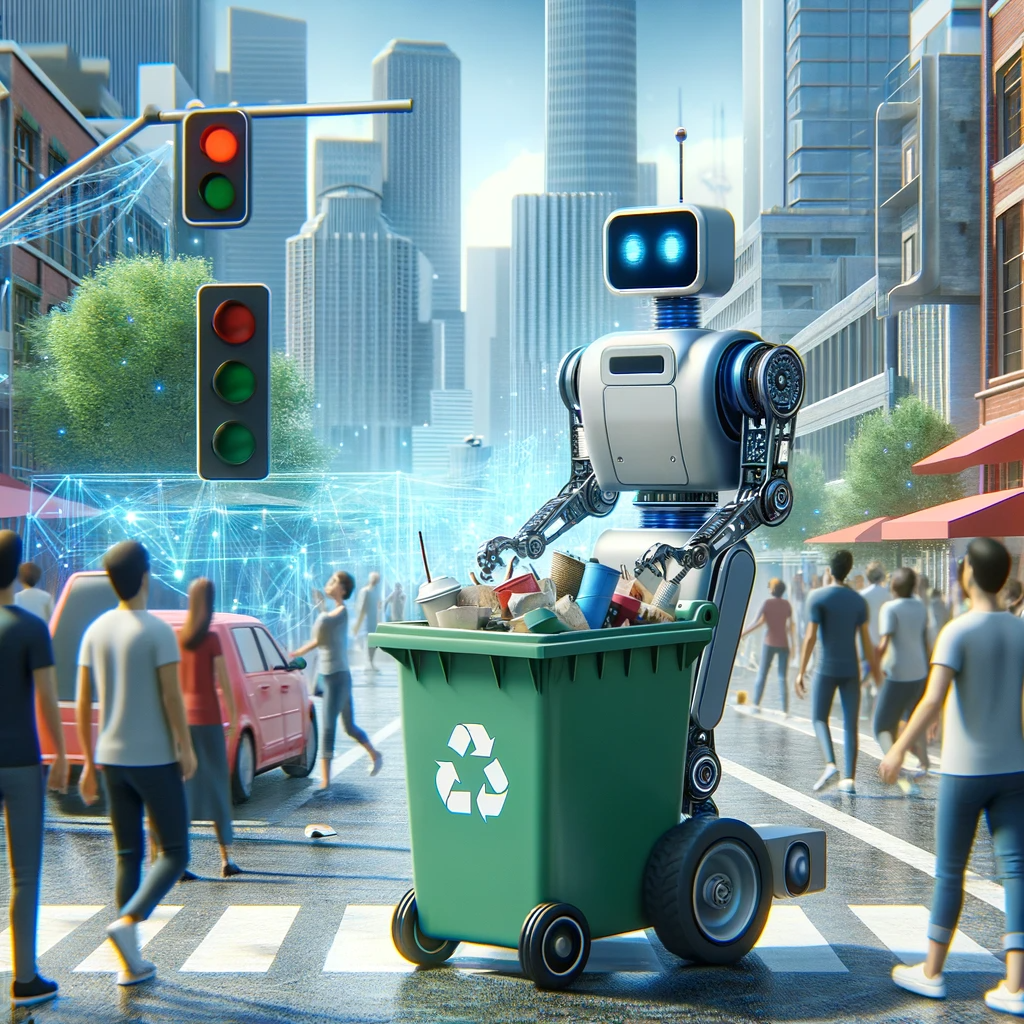As urbanization accelerates around the world, so does the challenge of managing the ever-increasing amount of waste generated by densely populated cities. Urban waste management has become a critical issue, with waste volumes rising, environmental concerns escalating, and the resources needed to handle this influx stretched thin. In the midst of this urban waste crisis, Artificial Intelligence (AI) emerges as a promising and transformative solution.
AI, with its ability to process vast amounts of data, make real-time decisions, and learn from patterns, offers innovative ways to address the complex problems associated with urban waste management. This article embarks on an exploration of the role AI plays in revolutionizing waste collection, sorting, and recycling processes in urban areas. It delves into how AI-driven solutions are reshaping the landscape of waste management, offering the potential to create cleaner, more sustainable cities.
As we navigate the challenges of urbanization and the environmental imperative to reduce waste and recycle more, AI stands as a beacon of hope—a technological ally that can optimize and enhance every facet of urban waste management. This article takes you on a journey through the convergence of AI and waste management, highlighting the transformative potential that lies within this powerful partnership.
The Basics of AI in Waste Management
To understand the potential of AI in waste management, it’s essential to grasp the fundamentals of AI itself:
Artificial Intelligence (AI) refers to computer systems capable of performing tasks that typically require human intelligence. These tasks include learning, problem-solving, decision-making, and pattern recognition.
In the context of waste management:
AI Applications: AI applications in waste management encompass various technologies, such as machine learning, computer vision, and data analytics. These tools empower waste management systems to operate smarter and more efficiently. AI can be deployed across multiple stages of waste management, from collection to recycling.
The Urban Waste Management Challenge
Urban areas worldwide are grappling with an escalating waste management crisis. The challenges are multifaceted and pressing:
The rapid urbanization and population growth are leading to an unprecedented increase in waste production. As cities expand, so do their waste generation rates, straining existing waste management systems.
Environmental Impacts: Improper waste disposal, landfill overflows, and inadequate recycling efforts contribute to environmental degradation. Pollution, habitat destruction, and greenhouse gas emissions are among the dire consequences.
Limited Resources: Managing urban waste demands substantial resources in terms of labor, vehicles, and infrastructure. Many cities struggle to allocate the necessary resources efficiently.
Given these challenges, it is imperative to explore innovative solutions that can alleviate the pressures on urban waste management systems and create more sustainable urban environments.

AI in Waste Collection
AI’s influence on waste collection processes goes beyond mere optimization; it introduces transformative capabilities that redefine how cities manage their waste:
Smart Routing and Scheduling: One of the primary challenges in waste collection is optimizing routes for collection vehicles. AI algorithms excel in this task by analyzing real-time data, including traffic conditions and historical waste generation patterns. By constantly adapting to changing conditions, AI ensures that collection trucks follow the most efficient paths, reducing fuel consumption, minimizing emissions, and conserving valuable resources.
Sensory Technology: AI-powered sensors attached to waste bins have revolutionized waste collection. These sensors monitor fill levels in real-time and send alerts to waste management teams when bins are nearing capacity. As a result, collection efforts can be prioritized based on demand, reducing unnecessary trips and resource wastage. The implementation of AI-driven sensory technology has not only enhanced operational efficiency but also significantly reduced costs.
Success Stories: Several cities and waste management companies worldwide have embraced AI-based waste collection systems with remarkable success. These systems have led to substantial cost savings, increased efficiency, and reduced environmental impact. Examining these real-world examples provides tangible evidence of AI’s transformative potential in optimizing waste collection in urban areas.
AI in Waste Sorting and Recycling
AI’s impact on waste sorting and recycling processes is revolutionizing the way recycling centers operate:
Automated Sorting: Traditional recycling facilities rely on manual sorting methods, which are labor-intensive and prone to errors. AI-powered robotic systems equipped with advanced computer vision technology can identify and separate recyclable materials from mixed waste streams with unmatched precision. This increased accuracy results in higher recycling rates, cleaner waste streams, and ultimately a more sustainable recycling process.
Quality Control: AI plays a crucial role in maintaining the quality of recycled materials. AI-driven quality control systems can identify contaminants and ensure that materials meet stringent recycling standards. By preventing contaminants from entering the recycling stream, these systems reduce the risk of contamination, enhance the quality of recycled materials, and promote a closed-loop recycling process.
Efficiency and Cost Reduction: The automation of sorting and recycling processes through AI not only improves accuracy but also reduces labor costs, enhances overall efficiency, and increases the economic viability of recycling operations. This cost-effectiveness further incentivizes cities and organizations to invest in AI-driven recycling technologies.
AI for Predictive Analytics
Predictive analytics is a powerful application of AI in waste management that revolutionizes resource allocation and waste collection strategies:
Waste Generation Patterns: AI algorithms analyze historical data to predict waste generation patterns. By identifying trends and seasonal variations, waste management authorities can anticipate future waste volumes accurately. This predictive capability allows for better resource planning, ensuring that cities allocate collection trucks and recycling facilities efficiently.
Resource Allocation: Waste management agencies can use AI-driven predictive analytics to allocate resources, such as collection trucks and recycling facilities, more effectively. By aligning resources with anticipated demand, cities can optimize their operations, reduce operational costs, and minimize their environmental footprint.
Environmental Impact: Predictive analytics also contributes to reducing the environmental impact of waste management. It enables proactive responses to waste hotspots, preventing overflow situations and illegal dumping. This proactive approach not only maintains the cleanliness of urban areas but also safeguards the environment from potential harm.
AI and Circular Economy
AI is a driving force behind the transition to a circular economy, where waste is minimized, and resources are conserved:
Reducing Waste Generation: AI-driven initiatives encourage consumers and businesses to reduce waste generation by optimizing product design, promoting repair and reuse, and discouraging single-use items. By analyzing consumption patterns and identifying areas for waste reduction, AI helps minimize the creation of waste at its source.
Promoting Recycling: AI-powered systems facilitate the identification and sorting of recyclable materials with unmatched precision. This ensures that a higher percentage of waste is diverted from landfills and reintroduced into the production cycle. AI optimizes recycling processes, making them more efficient and environmentally friendly.
Resource Efficiency: AI identifies opportunities for resource recovery and waste-to-energy processes. By extracting value from waste materials, such as converting organic waste into biogas or using non-recyclable plastics for energy generation, AI promotes resource efficiency, reducing waste and maximizing resource utilization.
Challenges and Ethical Considerations
While AI offers tremendous potential in waste management, it is crucial to address challenges and ethical considerations associated with its deployment:
Data Privacy: AI-driven waste management systems often collect data from sensors and waste management operations. Protecting the privacy and security of this data is essential to prevent breaches and misuse. Robust data protection measures must be implemented to safeguard sensitive information.
Job Displacement: The automation of certain waste management tasks through AI may impact employment in the sector. It is vital for cities and organizations to ensure a just transition for affected workers by offering retraining and opportunities in emerging AI-driven roles.
Responsible AI Usage: Responsible and ethical AI deployment is essential to avoid unintended consequences, such as algorithmic bias or decision-making errors. Transparency, accountability, and fairness must be integral aspects of AI-driven waste management systems to ensure responsible and equitable outcomes.
Successful AI Waste Management Projects
Numerous cities and organizations worldwide have successfully implemented AI-driven solutions for waste management. These real-world success stories serve as testament to the tangible benefits of AI in improving waste collection efficiency, enhancing recycling rates, and reducing costs. By examining these projects, we gain insights into the practical applications of AI in urban waste management and the positive outcomes it can deliver.
Future Prospects and Innovations
The future of AI in urban waste management is filled with promise and innovation:
Waste-to-Energy Solutions: AI will continue to optimize waste-to-energy processes, maximizing energy recovery from waste materials. Advanced AI-driven systems will make waste-to-energy technologies more efficient, contributing to both waste reduction and sustainable energy generation.
Advanced Recycling Technologies: Innovations in AI-driven recycling technologies will further enhance the recovery of valuable resources from waste streams. These technologies will enable more precise material identification and separation, resulting in cleaner recycled materials.
Waste Reduction Strategies: AI will continue to enable waste reduction initiatives, influencing consumer behavior and encouraging sustainable practices. By analyzing consumption patterns and identifying areas for waste reduction, AI will play a pivotal role in reducing waste generation and promoting a circular economy.
In conclusion, the integration of AI into urban waste management marks a transformative journey toward cleaner, more sustainable cities. AI’s role extends from optimizing waste collection and recycling to fostering circular economies and reducing waste at its source. As urban centers grapple with mounting waste challenges, AI offers a beacon of hope—a powerful tool to address urban waste management problems and pave the way for greener, more sustainable urban environments.

Conclusion
The integration of Artificial Intelligence (AI) into urban waste management represents not just a technological advancement but a transformative journey towards cleaner, more sustainable cities. Throughout this article, we have explored the multifaceted role of AI in revolutionizing waste collection, sorting, recycling, and the broader aspects of waste management. The implications are profound, offering the potential to address pressing urban waste challenges and create greener urban environments.
AI’s Influence on Waste Collection: AI has redefined waste collection by introducing efficiency and precision into routing, scheduling, and monitoring. Smart routing algorithms and real-time sensors optimize collection routes, reducing fuel consumption and minimizing environmental impact. Cities and waste management organizations worldwide have witnessed remarkable cost savings and operational streamlining through the implementation of AI-based waste collection systems.
AI’s Impact on Waste Sorting and Recycling: Recycling facilities are benefiting from AI’s ability to identify and separate recyclable materials with unparalleled accuracy. Automated sorting systems, driven by computer vision technology, enhance recycling rates and produce cleaner waste streams. The cost-effectiveness and efficiency gains realized by these AI-driven innovations are reshaping the recycling landscape.
Predictive Analytics and Resource Optimization: AI’s predictive analytics capabilities empower waste management authorities to anticipate waste generation patterns and allocate resources more effectively. This proactive approach reduces costs, ensures timely waste collection, and mitigates environmental impact. AI-driven predictive analytics promises a more efficient and sustainable waste management future.
AI and the Circular Economy: AI is a driving force in the transition towards a circular economy, promoting waste reduction, recycling, and resource efficiency. Initiatives powered by AI encourage consumers and businesses to reduce waste generation, optimize recycling processes, and recover resources from waste materials. These efforts are pivotal in minimizing waste’s environmental footprint and advancing the principles of a circular economy.
Challenges and Ethical Considerations: While AI offers significant benefits, addressing challenges and ethical considerations is crucial. Data privacy, potential job displacement, and responsible AI usage must be central considerations in the deployment of AI-driven waste management systems. Striking a balance between technological advancement and ethical responsibility is essential.
Successful AI Waste Management Projects: Numerous cities and organizations worldwide have successfully implemented AI-driven solutions, delivering tangible benefits such as cost savings, enhanced efficiency, and reduced environmental impact. These projects underscore AI’s practical applications and its potential to reshape waste management practices on a global scale.
Future Prospects and Innovations: Looking ahead, AI’s role in urban waste management holds immense promise. AI-driven waste-to-energy solutions, advanced recycling technologies, and waste reduction strategies are poised to further reduce waste, enhance resource recovery, and promote sustainability.
In conclusion, the integration of AI into urban waste management marks a pivotal moment in the quest for cleaner, more sustainable cities. As urban centers grapple with mounting waste challenges, AI offers a beacon of hope—a powerful tool to address urban waste management problems and pave the way for greener, more sustainable urban environments. Embracing AI as a partner in waste management is not just a technological choice; it is a commitment to creating a better, cleaner future for urban communities and the planet as a whole.
